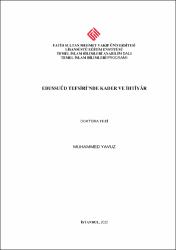Ebussuûd Tefsiri’nde Kader ve İhtiyâr
Künye
YAVUZ, Muhammed, Ebussuûd Tefsiri’nde Kader ve İhtiyâr, Fatih Sultan Mehmet Vakıf Üniversitesi Lisansüstü Eğitim Enstitüsü Temel İslam Bilimleri Anabilim Dalı Temel İslam Bilimleri Programı, Yayımlanmamış Doktora Tezi, İstanbul 2022.Özet
Tezimiz, ġeyhülislam Ebussuûd Efendi‟nin İrşâdü‟l-Akli‟s-Selîm ilâ Mezâye‟l-Kitâbi‟l-Kerîm adlı tefsirinde kader ve ihtiyâr konusunu ve bunlarla ilgili kavramların nasıl yorumlandığını işlemektedir.
Tezimiz, giriş ve sonuç dışında üç bölümden oluşmaktadır.
Giriş‟te Ebussuûd‟un hayatı, hocaları, ilmî kişiliği, eserleri; tefsiri ile kader ve ihtiyâr konuları hakkında yazılmış çalışmalara dâir bilgiler verilmiştir. Bu hususlara ilave olarak, çalışmamızın kaynak, yöntem, önem ve amaç yönlerine temas edilmiştir.
Birinci Bölüm‟de tezle doğrudan ilişkili olan kavramlardan; kader, kaza, irâde, ihtiyâr, meşîet, ilim, kudret, tekvîn ve fiilin sözlük anlamları verilmiş, akabinde ise ıstılâhî mânâları verilerek bu kavramlar özet olarak açıklanmaya çalışılmıştır.
İkinci Bölüm‟de kaderin kâinât ve beşerle münasebetinin işlendiği âyetler ile sünnetullâh, hidâyet, dalâlet, Allah‟ın ve kulların fiilleri, hayr ve şerrin Allah‟a nispeti konuları, selef ve halef ulemasının yorumlarıyla Ebussuûd‟un değerlendirmeleri muvacehesinde incelenmiştir.
Üçüncü Bölüm‟de öncelikle öne çıkan kelâm mezheplerinin özellikle ihtiyâra dâir görüşleri verilmiş, sonrasında Ebussuûd‟un ihtiyâr ve meşîet anlayışı ile rızâ ve cebir meşîetinin mâhiyetleri işlenmiştir.
Tezimizde, müfessirimizin kendilerine özel olarak yer vermesi nedeniyle, Zemahşerî ile Beydâvî‟nin eserlerine diğer tefsir kaynaklarına nispetle daha fazla müracaat edilmiştir.
Sonuç‟ta genel bir değerlendirme yapılarak, tezin konusu açısından önemli görülen neticeler sunulmaya çalışılmıştır. Our thesis covers the tafseer named İrşadü'l-Akli's-Selim ilâ Mezaye‟l-Kitabi'l-Kerim from Şeyhülislam Abu al-Saud Efendi and how the issues related to the “Fate” and “Free Will” are interpreted. Since Abu al-Saud Efendi makes special mention of two tafseer, Zemahşerî and Beydâvî as his sources, these books are used more than other commentaries in our study.
Our thesis consists of three parts except introduction and conclusion. In the introduction, Abu al-Saud's personality and works, and the views of the People of the Book about the “Fate” were conveyed; The source, method, importance and purpose of the thesis are explained.
In the First Chapter, the concepts directly related to the thesis; The dictionary meanings of destiny, accident, will, old age, mashîet, knowledge, power, genesis and verb are given, and then these concepts are tried to be explained in summary by giving their terminological meanings.
In the second chapter, the verses in which the relationship of fate with the universe and human beings are described and the issues of circumcision, guilt, wrongdoing, the deeds of Allah and the servants, good and evil from Allah, and the interpretations of Abu al-Saud's predecessor and successor scholars. The evaluations were collated and transferred.
In the third chapter, first of all, the opinions of prominent theological sects, especially about old age, are given, and then Ebussuud's understanding of elder and maşîet and the nature of consent and coercion are discussed.
As a result, a general evaluation of the topics covered in the thesis was made and the conclusions reached were mentioned.



















